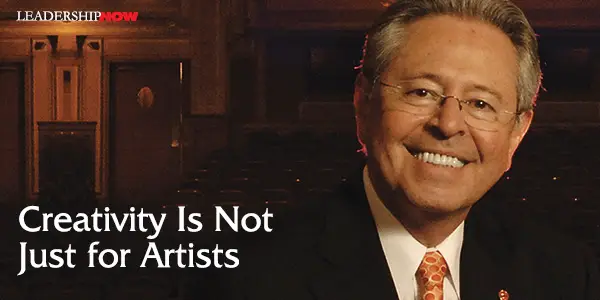 |
 |
04.30.08

Creativity Is Not Just For Artists
Miguel Angel Corzo, former President and CEO of The Colburn School, an accomplished leader himself and internationally recognized for his contributions to the arts, chaired a session on creativity at the What Makes Us Human? conference in Los Angeles. In his presentation, he touched on a concept that can’t be emphasized enough—the Creative Economy. We are caught up in a social and economic revolution that urgently calls for people that are creative, innovative, and adaptable. As choreographer Twyla Tharp wrote, “Creativity is not just for artists. It’s for businesspeople looking for a new way to close a sale; it’s for engineers trying to solve a problem; it’s for parents who want their children to see the world in more than one way.” Corzo remarked, “What was once central to corporations—price, quality, and much of the left-brain, digitized analytical work associated with knowledge—is fast being shipped off to other countries. Increasingly, the new core competence is creativity—the right-brain stuff that smart companies are now harnessing to generate top-line growth. It isn't just about math and science anymore. It's about creativity, imagination, and, above all, innovation.” It’s not just about getting better, but getting different. Everyone in an organization has the shared responsibility to be creative. We all have creativity, but we all have it differently. The challenge organizations face is to not only to utilize the creative capacities of their people but to develop them as well. Corzo outlined six ways organizations are trying to develop creative capacities in their people: Analogy and Metaphor - not only useful for visualization, but also for problem-solving: if we can resolve an analogous situation or issue, we can perhaps then solve the particular challenge we are facing. Perception - the ability to see patterns where others are unable to do so Simplicity - the most creative solution could be the most simple Adversity - dealing with obstacles through innovative thinking Technical Mastery - using the proper tools, techniques, and methods Persistence - New ideas, new art, new discoveries and inventions that often defy traditional concepts or aesthetics and are not readily accepted. But creativity demands that the innovator persists in the face of such obstacles. Corzo asserted, “Creativity is the ultimate intellectual property.” He added, “The time has arrived for creative people to take their places as leaders of society in professions other than the arts. The specific talent in people with a creative intelligence is the asset most needed by today’s emerging global creative economy: the expression of ideas through design and storytelling.”
Posted by Michael McKinney at 10:20 AM
|
BUILD YOUR KNOWLEDGE
 

How to Do Your Start-Up Right STRAIGHT TALK FOR START-UPS 
Grow Your Leadership Skills NEW AND UPCOMING LEADERSHIP BOOKS 
Leadership Minute BITE-SIZE CONCEPTS YOU CAN CHEW ON 
Classic Leadership Books BOOKS TO READ BEFORE YOU LEAD |